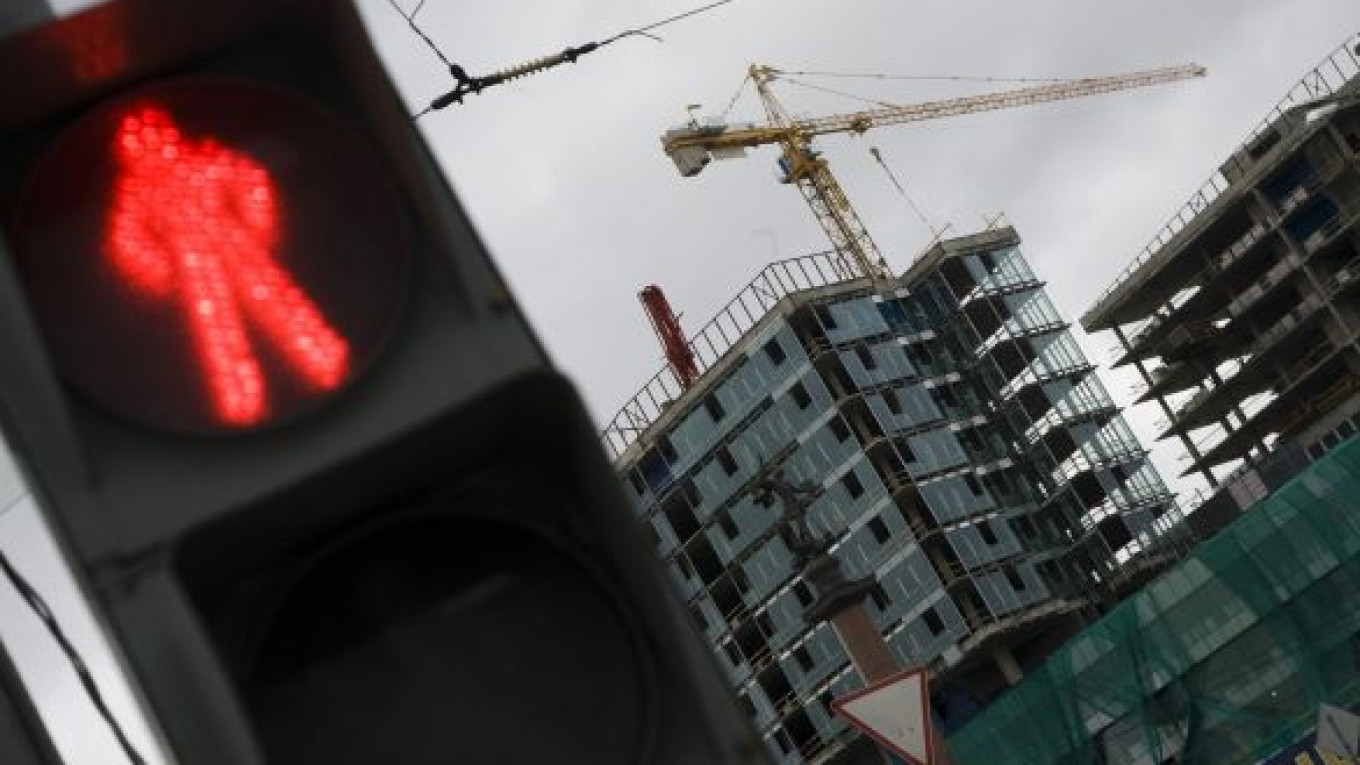The statistical results, if not the reality, on new housing completion for 2010 will be higher than expected, helped by interested property owners and creative paperwork.
Regional Development Minister Viktor Basargin said at a Vedomosti forum that this year 59 million square meters of new housing space will be ready for use, instead of the previously projected 57 million square meters.
From January through October, according to his data, 37.7 million square meters were accepted and certified, leaving more than 21 million square meters of space to be processed in the last two months of the year.
It’s become a tradition that builders sharply increase their rate of delivery in the last few months of the year. For example, in the first three quarters of 2009 Sverdlovsk saw 854,900 square meters come on line, but the number reached nearly 1.6 million square meters by the start of 2010.
In Krasnodar this year officials expect that more than 1 million square meters will be completed, despite the fact that "going through the city, you see that construction is frozen," said Mikhail Malikov, president of Avgur Estate.
This end-of-year rush is due in part to a drive by bureaucrats to make impressive statistics about how private housing is growing in their region. For example, in Rostov-on-Don, the share of private housing in 2010 reached 81.4 percent, according to the Rostov statistics bureau.
The situation is similar in other regions. In 2009 Omsk saw 605,200 square meters delivered, more than half of which was private, according to the State Statistics Service.
The “dacha amnesty” — which allows cottage and plot owners an easy way to formalize the paperwork that certifies their properties as “complete” — helped bring up the numbers for several regions, said Alexander Krapin, chief executive of the Rway agency. Titles to 3 million properties, most of which were summer cottages, should be registered.
"If we assume that each plot has a house, even if its only 30 square meters, that already gives an increase of 90 million square meters nationwide. We can assume that as a result of the dacha amnesty several tens of millions of square meters will eventually be registered,” Krapin said. By delaying the paperwork process, this incremental increase can be spread over several years, he said.
In big urban centers like Moscow, cottages are not built within the city limits, but the situation with an uneven introduction of new building space in the course of the year is the same as in most regions. By October of this year, the Moscow City Statistics Service recorded the completion of 1.12 million square meters of housing, while a spokesman for the urban construction sector said that in the last quarter the remainder of the planned 2 million square meters will be handed over.
"The fact that for the last quarter more than half of the planned annual volume is delivered is a common statistical occurrence,” said Alexei Dobashin, chief executive of concern Krost.
"Getting acceptance for a building in December is simpler because officials also need to show results for the year," said Denis Kolokolnikov, chief executive of consulting company RRG.
Vladimir Voronin, president of construction company Leader, sees the mathematics of the builders as part of a bureaucratic psychology. “The legacy of the Soviet period is still fresh, when everyone was trying to ‘catch up and overtake’ by fulfilling five-year plans."
Regional leaders push to improve statistics out of a fear of losing their jobs, one developer said. Their work is evaluated on several criteria, with socioeconomic indicators — like how much new housing is ready — being in first place.
"Its not only state agencies that inflate the numbers, but also developers,” Voronin said. “For example, as it heads for an IPO, a company says it employs 100,000 people, while in reality it has only 40,000, or that it completed 1,000 square meters more than it did. Inflated numbers influence its investment attractiveness,” Voronin said. “And there is nothing really wrong with that.”
One Moscow developer, who requested anonymity, disclosed a method favored by officials to pad their numbers: "For example, in December the developer receives the preliminary report on compliance and the same December a registration number for the building’s entry into service is issued. The building gets counted in this year’s statistics, but might actually take several more months to finish, and hence is completed only the following year.
Alexei Pashkevich, chief executive of Miel-regions, said that in some regions there is a procedure called “two-step delivery” of new housing, by which the same new building could appear under different names in reports from different years.
A Message from The Moscow Times:
Dear readers,
We are facing unprecedented challenges. Russia's Prosecutor General's Office has designated The Moscow Times as an "undesirable" organization, criminalizing our work and putting our staff at risk of prosecution. This follows our earlier unjust labeling as a "foreign agent."
These actions are direct attempts to silence independent journalism in Russia. The authorities claim our work "discredits the decisions of the Russian leadership." We see things differently: we strive to provide accurate, unbiased reporting on Russia.
We, the journalists of The Moscow Times, refuse to be silenced. But to continue our work, we need your help.
Your support, no matter how small, makes a world of difference. If you can, please support us monthly starting from just $2. It's quick to set up, and every contribution makes a significant impact.
By supporting The Moscow Times, you're defending open, independent journalism in the face of repression. Thank you for standing with us.
Remind me later.






